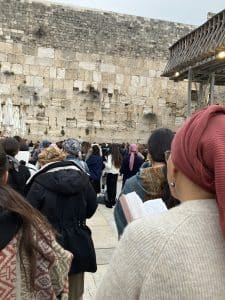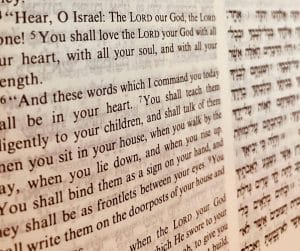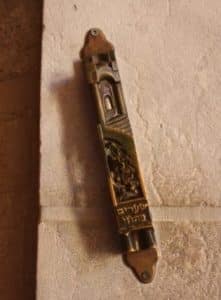The people of Israel and Jewish people worldwide were called to pray the “Shema” recently, to come together as one and ask for the mercy of God. The main gathering was to be at the Western Wall, and prayers went up for the hostages and for the whole nation in deep pain and crisis.
Reciting the Shema is something that historically unites the Jewish people, and it’s something most know by heart from childhood. It’s a passage from Deuteronomy 6, and it begins with the Hebrew word “Shema” which means “Hear”. Here’s how it goes:
“Hear, O Israel: The Lord our God, the Lord is one. You shall love the Lord your God with all your heart and with all your soul and with all your might.”
The text continues like this:
“And these words that I command you today shall be on your heart. You shall teach them diligently to your children, and shall talk of them when you sit in your house, and when you walk by the way, and when you lie down, and when you rise. You shall bind them as a sign on your hand, and they shall be as frontlets between your eyes. You shall write them on the doorposts of your house and on your gates.” (Deuteronomy 6:4-9)

The Shema is typically only referring to the first part of the passage: “Hear, O Israel: The Lord our God, the Lord is one. You shall love the Lord your God with all your heart and with all your soul and with all your might.” In a similar way to how those from Christian nations might know and recite the Lord’s Prayer, or find a sense of unity in saying the Apostles’ Creed together, most Israelis know the Shema by heart, and reciting it brings a sense of belonging as well as comfort. Several of those who survived the October 7 massacre relayed how they started furiously saying the Shema when they realized their lives were greatly in danger, as also happened in the Holocaust on the way to the gas chambers.
It’s seen like a lifeline, a hotline to God. Let’s take a closer look at it.
Shema Israel, the Lord is One
“Hear, O Israel: The Lord our God, the Lord is one. You shall love the Lord your God with all your heart and with all your soul and with all your might.”
The first thing to draw attention to is that the Lord (יהוה, Yahweh) is mentioned three times. I’d say that is significant. And the Hebrew word for “one” is very interesting as well.
This central statement about the oneness of God, however, is one of the main reasons that Jewish people struggle to consider Jesus as the Messiah. How can it possibly be that there could be God the Father, God the Son, and God the Holy Spirit? It sounds like polytheism and idolatry to Jewish ears.
What does it mean that the Lord is one?
The Hebrew word for “one” is אחד (echad) which is the root word for the number one, but also unity. It can convey the meaning of a complex unity, in a similar way to the word “nature”, which is a singular concept but includes plurality at the same time. We see the importance of this word when it’s juxtaposed in contrast with a similar word: יחיד (yechid), which means one in particular, a singular one, the only one.
 This has greatly affected Jewish thought over the generations, but Judaism is not famous for its enthusiasm about theology, and barely touched the subject until the Middle Ages. The Hebrew Scriptures do not really contain much in the way of theology at all. There’s a lot of narrative and stories, and of course many laws and commandments, but not much written about what we should believe or how we are to make sense of it. For example, it’s written that Solomon had 800 wives but that’s not a biblical endorsement for polygamy! We’re just told the stories as examples to meditate on and learn from. The New Testament is different. The first four gospels are also narrative, full of the stories of Jesus, but the letters of Paul contain a lot of theology and explanation about what it all means, what we believe, and how to live accordingly. It’s said that while Christianity is concerned primarily with faith, Judaism is more about action. Deed rather than creed, if you like. This was the case for many centuries but when in the Middle Ages there was a clash between Islam, Christianity and Judaism, all claiming to be true, there was much debate and out of this era a rabbi called Maimonides (the Rambam) eventually developed his famous Thirteen Principles of Faith for Jewish people, constructed, it has to be said, in order to set Judaism apart from belief in Jesus or the Muslim faith.
This has greatly affected Jewish thought over the generations, but Judaism is not famous for its enthusiasm about theology, and barely touched the subject until the Middle Ages. The Hebrew Scriptures do not really contain much in the way of theology at all. There’s a lot of narrative and stories, and of course many laws and commandments, but not much written about what we should believe or how we are to make sense of it. For example, it’s written that Solomon had 800 wives but that’s not a biblical endorsement for polygamy! We’re just told the stories as examples to meditate on and learn from. The New Testament is different. The first four gospels are also narrative, full of the stories of Jesus, but the letters of Paul contain a lot of theology and explanation about what it all means, what we believe, and how to live accordingly. It’s said that while Christianity is concerned primarily with faith, Judaism is more about action. Deed rather than creed, if you like. This was the case for many centuries but when in the Middle Ages there was a clash between Islam, Christianity and Judaism, all claiming to be true, there was much debate and out of this era a rabbi called Maimonides (the Rambam) eventually developed his famous Thirteen Principles of Faith for Jewish people, constructed, it has to be said, in order to set Judaism apart from belief in Jesus or the Muslim faith.
Here are Rambam’s thirteen principles of faith, two of which deny the deity of the Messiah:
- Belief in the existence of the Creator, who is perfect in every manner of existence and is the Primary Cause of all that exists.
- The belief in God‘s absolute and unparalleled unity.
- The belief in God‘s non-corporeality, nor that He will be affected by any physical occurrences, such as movement, or rest, or dwelling.
- The belief in God‘s eternity.
- The imperative to worship God exclusively and no foreign false gods.
- The belief that God communicates with man through prophecy.
- The belief in the primacy of the prophecy of Moses our teacher.
- The belief in the divine origin of the Torah.
- The belief in the immutability of the Torah.
- The belief in God‘s omniscience and providence.
- The belief in divine reward and retribution.
- The belief in the arrival of the Messiah and the messianic era.
- The belief in the resurrection of the dead.
If you believe in Jesus as we do, the chances are that you’ll believe a lot of these statements as well. But there are a couple that stick in the throat: numbers 2 and 3 are designed to rule out the deity of Jesus as Messiah, and that’s something we can’t go along with. Most Jewish people believe that God cannot possibly ever come as flesh because Rambam said so. These principles have been in place for so long, over a thousand years, and so they seem as ancient as the word of God itself. But these are not the words of God. These are the words of Maimonides writing in the Middle Ages. There’s much in the Hebrew Scriptures to indicate the opposite, that God has always planned to come to us in the flesh and has promised it in His word repeatedly—something we love to discuss in ONE FOR ISRAEL.
Elohim, the word for God in the Bible, is a plural word. He says in Genesis 1:26, “Let us make man in our own image”. Moreover, the three visitors to Abraham clearly show Yahweh in the flesh (see Genesis 18), negating Rambam’s third principle that God cannot be in human or corporeal form. Yes He can. And He has done so.
Unity or singularity?
The other principle with which we’d take issue is number 2 which instead of using the word אחד (echad) as is written in the Shema, Rambam uses the word יחיד (yechid) to emphasize that God is very much singular, individual, the one and only. Of course, we’d also affirm that there is only one God, but this word is used to try and counter the belief in Father, Son and Spirit as three in one—a complex unity. The ironic thing is that the word יחיד (yechid) is only ever used in the Bible of human beings, such as Isaac (Abraham’s one and only son) and also the one and only daughter of Japheth in the book of Judges. Most significantly, it’s used in Zechariah 12:10 about how the Jewish people will one day see the truth about the Messiah!
And I will pour out on the house of David and the inhabitants of Jerusalem a spirit of grace and pleas for mercy, so that, when they look on me, on him whom they have pierced, they shall mourn for him, as one mourns for an only child [יחיד yechid], and weep bitterly over him, as one weeps over a firstborn. (Zechariah 12:10)
So Rambam used this word about God even though the Bible never does, apart from this verse in Zechariah when it’s talking specifically about God as incarnated in the person of Jesus, a human being. The other irony is that the root is different, and is all about the concept of togetherness. יחד (Yachad) means together. Human beings might be separate and unique individuals, but we are made of mind, body and spirit, of multiple limbs, organs and body parts, and many, many atoms. We’re also a complex unity! But yechid is not a word the Bible uses of the Lord God, יהוה Yahweh. Yahweh, as it says in Deuteronomy 6, is אחד (echad), the same word used to describe man and wife becoming united as one.
The LORD mentioned three times in the Shema
“Hear, O Israel: THE LORD our God, THE LORD is one. You shall love THE LORD your God with all your heart and with all your soul and with all your might.”
 As if dropping a hint, the word for “The Lord” (יהוה, Yahweh) appears three times in the Shema. This is also the passage contained in mezuzahs on Jewish doorframes. In order to keep the instruction, “You shall write them on the doorposts of your house and on your gates”, the tradition has developed to have this text on a rolled up bit of paper and kept in a little holder attached to doorframes. You see them everywhere in Israel. They usually have the Hebrew letter “Shin” on them, which looks like this: ש. This is the first letter of the Shema, and also stands for one of the names of God, El Shaddai. But if you look again at that letter, you’ll see that it too is an expression of three in one!
As if dropping a hint, the word for “The Lord” (יהוה, Yahweh) appears three times in the Shema. This is also the passage contained in mezuzahs on Jewish doorframes. In order to keep the instruction, “You shall write them on the doorposts of your house and on your gates”, the tradition has developed to have this text on a rolled up bit of paper and kept in a little holder attached to doorframes. You see them everywhere in Israel. They usually have the Hebrew letter “Shin” on them, which looks like this: ש. This is the first letter of the Shema, and also stands for one of the names of God, El Shaddai. But if you look again at that letter, you’ll see that it too is an expression of three in one!
Hear O Israel
As we have said, the word “Shema” means “hear”, since that’s the beginning of the text. But despite the fact that the Talmud begins with an entire tractate dedicated to the times and ways in which one should pray the Shema, nowhere in Scripture are we asked to pray this Bible passage. Quite the opposite. We’re not commanded to say it, we’re commanded to “HEAR” it. To listen and obey it. The Shema is not a prayer to be prayed, but a command to be obeyed. We’re supposed to hear God saying it, and then put it into practice. In fact, the only time we see someone coming anywhere close to reciting the Shema in the Bible is in the New Testament, when Jesus Himself answers a tough question:
And one of the scribes came up and heard them disputing with one another, and seeing that he answered them well, asked him, “Which commandment is the most important of all?”
Jesus answered, “The most important is, ‘Hear, O Israel: The Lord our God, the Lord is one. And you shall love the Lord your God with all your heart and with all your soul and with all your mind and with all your strength.’ The second is this: ‘You shall love your neighbor as yourself.’ There is no other commandment greater than these.” (Mark 12:28-31)
Jesus is one of the Jewish people, from the tribe of Judah, and He also affirmed the central importance of the Shema like any good Jew. But He refers to the passage as a commandment, not a prayer. And it was interesting to me that during the ceremony at the Western Wall, we not only said the Shema together, but read a passage of Scripture that was all about Him.
Praying the Psalms for Israel
The main event at the Western Wall on Thursday March 21 2024 was live streamed so people could join from all over the world. The crowd were led through the Shema and also prayed through a few Psalms together, expressing the bitter grief of the nation at this time and calling on God for His help. We read Psalm 130, which was very appropriate at this time:
Out of the depths I cry to you, O Lord! O Lord, hear my voice!
Let your ears be attentive to the voice of my pleas for mercy!
If you, O Lord, should mark iniquities, O Lord, who could stand?
But with you there is forgiveness, that you may be feared.
I wait for the Lord, my soul waits, and in his word I hope;
my soul waits for the Lord
more than watchmen for the morning,
more than watchmen for the morning.
O Israel, hope in the Lord!
For with the Lord there is steadfast love, and with him is plentiful redemption.
And he will redeem Israel from all his iniquities.
Prayers of intercession were prayed for the hostages and for all those in grief and trouble. Then Psalm 22 was read out, the psalm Jesus Himself referred to on the cross when He called out the first verse: “My God, my God, why have you forsaken me?” Psalm 22 is a Messianic psalm, full of prophecies about what would happen to Jesus. It was very meaningful to read that psalm with Jewish people calling on God in our time of distress.
The people of Israel as a “type” of Suffering Servant
Here are some of the verses from Psalm 22 that are particularly pertinent:
But I am a worm and not a man, scorned by mankind and despised by the people.
All who see me mock me; they make mouths at me; they wag their heads;
“He trusts in the Lord; let him deliver him; let him rescue him, for he delights in him!”
(vv.6-8)
Believers in Jesus will recognize the scene at the cross right away, but the words also are a powerful prayer for anyone who is afflicted at the hands of cruel enemies. The Jewish people are experiencing unrelenting hatred and derision, even in the wake of the most terrible assault since the Holocaust. People in the nations wag their head, scoff and scorn, and heap abuse on Israel, hurling criticism and demanding far higher standards of behavior—impossibly high standards—in a way that’s applied to no other nation. Antisemitism has at its core a hatred of God, of His law, and a rejection of His sovereign choice of Israel.
Israel has always been a target of hatred, and the suffering of the Jewish people has been unrelenting. It’s understandable then, that Israel sees a reflection of themselves in Isaiah 53, the well-known passage about the Suffering Servant. For all the fights about whether it’s really about the Messiah or really about the people of Israel, perhaps we can stop and consider that in some ways it is both. The “servant of the Lord” in the book of Isaiah in some places refers to the Messiah, in other places the people of Israel, and in yet others to the prophet Isaiah himself. It takes a bit of contextualized study to figure out which is which. And here’s the thing: sometimes they overlap. Sometimes it’s not one or the other, but these prophecies can apply in different ways to Israel and to the Messiah as well. Jesus is God’s Son, God’s anointed One, who came to fulfill the will of His Father in bringing salvation to all who receive Him. Israel, albeit in a different way, has also been chosen for God’s purposes—for the sake and the blessing of the whole world. So Satan has a special hatred reserved for God’s chosen people.
For dogs encompass me; a company of evildoers encircles me;
they have pierced my hands and feet...
(v.16)
Again, these words paint a clear picture of what happened at the crucifixion, but given the geographical reality of being surrounded by enemies who would torture and kill at any opportunity, the words also hold great meaning in this context of Israel’s suffering. As we gathered together at the wall to call upon God, the majority still blind to the messianic meaning of the psalm, the truth is that Israel remains chosen by God. God has set His choice and affection on the Jewish people to accomplish His purposes, and He will not forsake them. Even in unbelief about Jesus, many Israelis do believe in the God of Abraham, Isaac and Jacob, and are calling out in faith that He will save.
Instead of rejecting Israel for the tendency to be hard to the Gospel (a hardness which God Himself imposed in order that the Gospel would go out to the nations according to Romans 11:25), now is the time to have compassion on Israel and appreciate the suffering they have experienced at the hands of the world because of God’s purposes. Loving God with all our heart, soul, and might means loving God’s ways, His choices, His chosen people… and enemies too.
There’s comfort in the Scriptures that in the end, all will be known. The Messiah will be recognized by His people, Israel will be vindicated in the nations, and the earth will be filled with the glory of God as the waters cover the sea. Are you hearing this?
It shall be told of the Lord to the coming generation;
they shall come and proclaim his righteousness to a people yet unborn,
that he has done it. (Psalm 22:30-31)
Picture by Snowscat on Unsplash
















